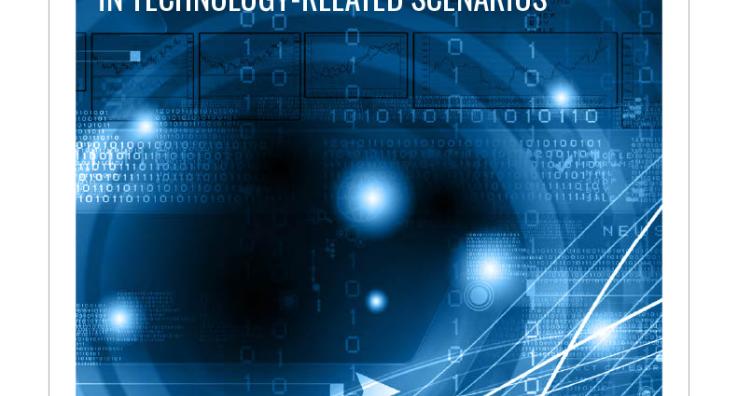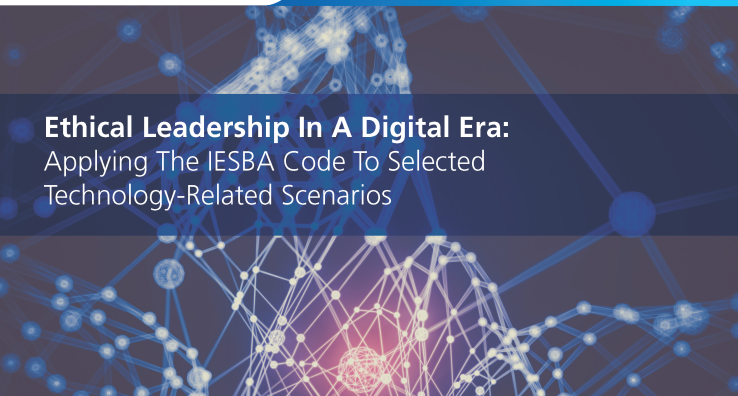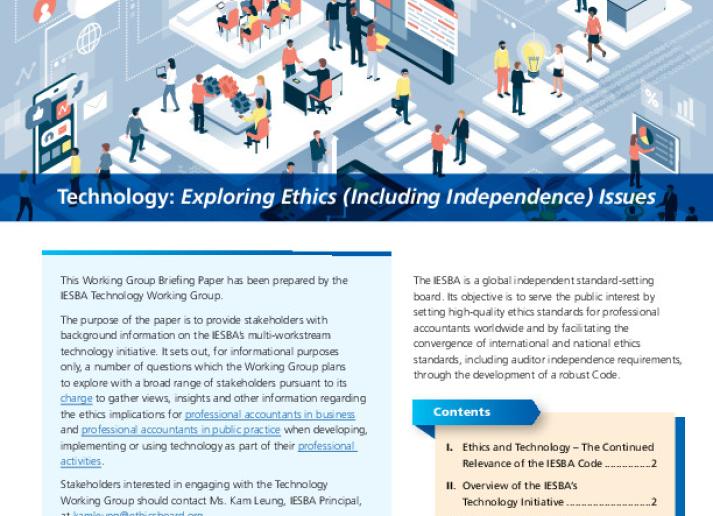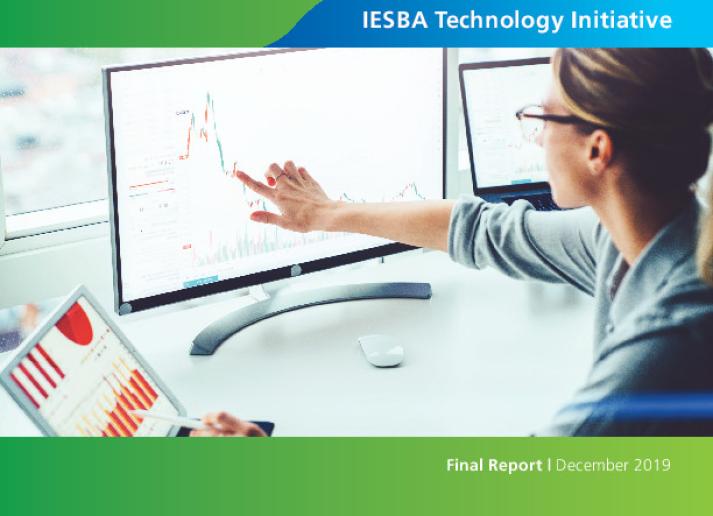Rapidly advancing new technologies significantly impact every aspect of the professional accountant’s (PA's) work. The PA’s skills and competencies, underpinned by ethics, trust, integrity and recognition of their public interest responsibility, are all critical in navigating the challenges and opportunities the advance of technology create. Irrespective of the technology used, professional accountants must comply with requirements in the International Code of Ethics for Professional Accountants, (including International Independence Standards).
This webpage compiles resources from across the world to assist both professional accountants in business (PAIBs) and in public practice (PAPPs), including auditors, navigate the ethical challenges and opportunities arising from evolving technologies. Regular visitors to this page will find updated guidance highlighting the relevance of IESBA’s Code of Ethics in developing, using and implementing evolving technologies.

APPLYING THE CODE'S CONCEPTUAL FRAMEWORK TO INDEPENDENCE
Practical Guidance for Auditors In Technology-related Scenarios
The publication describes key technology-related provisions of the International Code of Ethics for Professional Accountants (including International Independence Standards) and provides auditors with three practical examples involving technology-related non-assurance services to illustrate how to apply the Code's requirements with respect to independence.
This non-authoritative publication was developed jointly by the Staff of the Australian Accounting Professional & Ethical Standards Board (APESB) and IESBA under the auspices of the IESBA’s Technology Task Force, initiated as part of the IESBA’s Phase 2 Technology Working Group activities. Learn more about IESBA’s technology work here.

Technology-Related Revisions to the Code
Final Pronouncement
The Final Pronouncement: Technology-related Revisions to the Code will guide the ethical mindset and behavior of professional accountants in both business and public practice as they take advantage of the opportunities created by technology and adapt to new technology. Developed to remain relevant and applicable in the ever-evolving landscape of technology transformation, the revisions apply to the use of any technology, including to the extent possible, future technologies.
The revisions, which were informed by extensive fact-finding and stakeholder outreach:
- Strengthen the Code in guiding the mindset and behavior of professional accountants when they use technology.
- Provide enhanced guidance fit for the digital age in relation to the fundamental principles of confidentiality, and professional competence and due care, as well as in dealing with circumstances of complexity.
- Strengthen and clarify the International Independence Standards (IIS) by addressing the circumstances in which firms and network firms may or may not provide a technology-related non-assurance service to an audit or assurance client.
The revisions to the IIS will be effective for audits and reviews of financial statements for periods beginning on or after December 15, 2024. The other revisions to the ethics provisions of the Code will be effective as of December 15, 2024. Early adoption is permitted.

IESBA Technology Working Group Phase 2 Report
Released on November 18, 2022, this report builds off of IESBA's February 2020 Phase 1 Report and documents the impacts of disruptive and transformative technologies on the work of professional accountants, and provides extensive analysis and insights into the ethical dimension of those developments. The report also discusses the relevance and importance of the overarching principles and specific provisions in the International Code of Ethics for Professional Accountants (including International Independence Standards) (the Code) in laying out the ethical guardrails for professional accountants as they face opportunities and challenges in their work as a result of rapid digitalization.
The Report surveys the technology landscape and summarizes the outcomes of the Working Group’s fact-finding into the ethics implications of innovative technologies such as artificial intelligence, blockchain and cloud computing. It explores through the ethical lens various related issues, including data governance, cybersecurity, and reliance on, or use of, experts, and provides insights into those issues and the questions they raise. The Report includes ten recommendations which the IESBA will further consider, some of which it is already addressing in developing technology-related revisions to the Code.
For convenience, a dynamic webpage has been created for the Phase 2 Report. allowing users to easily navigate the sections and download relevant non-authoritative materials. Click here to visit.

Ethical Leadership In A Digital Era: Applying The IESBA Code To Selected Technology-Related Scenarios
This non-authoritative publication provides seven hypothetical scenarios to illustrate how accountants can navigate practical issues in ethical leadership when using or implementing technology.
Each scenario highlights the application of specific requirements and guidance in the IESBA Code, in particular those related to compliance with the fundamental principles of ethics, and auditor independence.
The publication was developed by the JICPA under the auspices of the International Ethics Standards Board for Accountants (IESBA)’s Technology Working Group.
IESBA Updates
Spotlight: Technology Issues and Thought Leadership
-
Additional Resources
Artificial Intelligence
Video Presentations
- Case Study in Ethical Use of AI Today | Danielle Supkis Cheek, Vice President of Strategy and Industry Relations at MindBridge AI
- Ethics for Sustainable Artificial Intelligence Adoption: Connecting AI and ESG, slides and report | Mr. Narayanan Vaidyanathan, Head of Business Insights, Association of Chartered Certified Accountants
- Ethics for sustainable AI adoption: connecting AI and ESG | IESBA TWG, CA-ANZ and ACCA panel discussion
Publications and Thought Leadership
- A CPA's introduction to AI: From algorithms to deep learning | CPA Canada/AICPA
Podcasts
- Tech and Ethics: The World Economic Forum's Kay Firth-Butterfield on Doing the Right Thing in AI | MIT Sloan Management Review
Blockchain
Video Presentations
- Use of Blockchain in Corporate and Financial Reporting, and Regulatory Implications and Slides | Dr. Kathleen Bakarich and Dr. John Castonguay, Assistant Professors of Accounting, Taxation, and Legal Studies in Business at Hofstra University
- Blockchain and Internal Control: Relevant Insights and Perspectives and Slides | Dr. Sri Ramamoorti, Associate Professor, University of Dayton, and Mr. Eric E. Cohen, Owner of Cohen Computer Consulting
- Blockchain and the Accounting Profession: Perspectives from Literature with an Emphasis on Ethics and Slides | Dr. Thomas Calderon, Professor of Accounting, The University of Akron
Publications and Thought Leadership
- Blockchain Technology: Shaping the Future of the Accountancy Profession | IFAC
- Blockchain Primer | OECD
Cybersecurity
Video Presentations
- Cybersecurity and The Accounting Profession and Slides | Dr. Thomas Calderon, Professor of Accounting, The University of Akron
- Cybersecurity: State of Play and Slides | Clinton Firth, EY Global Cybersecurity Energy Industry Leader
Thought Leadership and Publications
Ethics in the Digital Age
Publications and Thought Leadership
- Ethics, Technology, and the Professional Accountant in the Digital Age | IFAC
- Ethics and Trust in a Digital Age | ACCA
- Who Can Investors Trust to Provide Data Integrity and Intelligence? What Role Should Chartered Accountants Play in Tackling the Misinformation Crisis? | Vania Borgerth, IESBA Board Member
Robotic Process Automation
Video Presentations
-
Robotic Process Automation (RPA): Transforming the Finance Function and Slides | Loreal Jiles, Vice President of Research and Thought Leadership at the Institute of Management Accountants (IMA)









